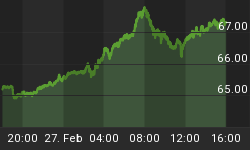By the first week of October, after having dropped more than 18 percent from its highs achieved in May 2011, U.S. stocks were desperate to latch on to any good news. In this context, the apparent agreement between the major European players to kick their debt can down the road was viewed as an "all clear" for shell shocked investors.
Since October 4th the Dow has rallied almost 10 percent, one of the best 10-day stretches in the history of the stock market. The gains have been enough to push the Dow into positive territory for the year. However, the agreement in Europe that sparked the good times solves absolutely nothing and virtually assures that problems will re-emerge in the near future.
To salvage their most indebted banks and some of their struggling periphery members, including Portugal, Ireland, Italy, Greece and Spain, Europe has agreed to create, and fund, the 440 billion euro ($590 billion) European Financial Stability Facility. It remains to be seen how this extra layer of bureaucracy will make any difference in putting the continent back on a sustainable path.
While a meeting between two Euro leaders (Sarkozy and Merkel) may have galvanized Eurozone politicians into more dramatic group action, the new Facility fails to address the intractable political problem that solvent countries are tiring of funding profligate neighbors. It also fails to reverse the fundamental structural problems that plague the euro.
Just a few weeks ago, when the EFSF bailout fund was announced, it was widely trumpeted as a cure-all. However, many have already deemed the Fund to be too small, with some calling for it to be increased five times to over $2 trillion. However, even $2 trillion would be a paltry sum with which to confront any debt problems erupting from larger countries such as Italy.
In his recent attempts to block the adoption of the EFSF, Mr. Richard Sulik, leader of Slovakia's Freedom and Solidarity Party said "I'd rather be a pariah in Brussels than have to feel ashamed before my children who would be deeper in debt should I raise funding for the EFSF bail-out mechanism." I believe that the vast majority of EU's 400 million citizens would echo this view. But with democracy crushed almost to death already within the EU, such a view would not easily be published. Unfortunately for young Slovaks, the plan passed.
The recent collapse of Dexia Bank, which had been considered to be fiscally sound earlier this year, was too big for Belgium to handle. Help was required from France and Luxembourg. However, it is important to understand that there are many banks in Europe that may have substantially more "troubled" assets than Dexia, which carried less than $600 billion of total assets on its balance sheet.
For instance, the three largest French banks which recently passed the euro stress test (as Dexia had in the past) have total assets of some $6.3 trillion, or about half of America's GDP! While it is unclear how much of these assets would fall into the "troubled" or "toxic" categories, it is reasonable to assume, given the extent to which these banks have loaded up on sovereign debt, that the percentage is not insignificant. Clearly then it will not take a tremendous amount of asset downgrades to force a systemic crisis. On this basis, how much confidence can be inspired by the new framework?
I believe that it is just a matter of time before these possibly catastrophic debt chasms erupt into full view. When they do, the euro itself may be pulled apart. In today's interconnected world, a collapse of the world's second largest currency would create such chaos that soon it would threaten the continued viability of the fiat U.S. dollar.
Facing these possibilities, as well as the realities of anemic U.S. economic growth, and the risk of disappointing Q3 corporate earnings, it is hard to trust the recent U.S. stock rally. This is particularly so as the rising stock prices have been based on very low volume.
It is time for investors to hope for the best but to plan on the worst. Part of this plan should involve greater care for portfolio currency selection, which is examined in greater detail in a report recently put out by Euro Pacific Capital.
Subscribe to Euro Pacific's Weekly Digest: Receive all commentaries by Peter Schiff, Michael Pento, and John Browne delivered to your inbox every Monday.
For an even more in depth look at the prospects of international currencies, download Peter Schiff's and Axel Merk's Five Favorite Currencies for the Next Five Years .
For a great primer on economics, be sure to pick up a copy of Peter Schiff's hit economic parable, How an Economy Grows and Why It Crashes.















